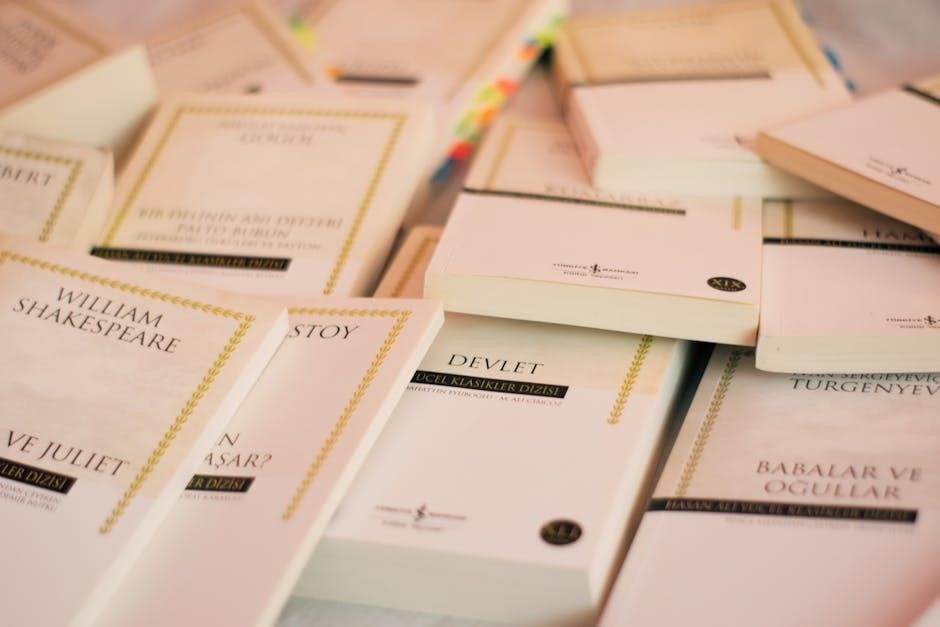Major Themes
Love vs. Hate
The intense rivalry between Montagues and Capulets showcases hate’s destructive power, contrasting with Romeo and Juliet’s pure, passionate love that transcends familial feud.
Fate
The prologue introduces fate as a dominant force, labeling the lovers “star-cross’d,” suggesting their doom is predetermined and inevitable.

Loyalty
Characters like Friar Laurence and the Nurse exhibit loyalty, while others, like Tybalt, prioritize family honor over compassion, highlighting loyalty’s complexity.
Impulsive Behavior
Romeo’s hasty decisions, such as marrying Juliet and killing Tybalt, drive the tragic outcomes, emphasizing how impulsiveness can lead to devastating consequences.
These themes intertwine to explore human emotions and societal conflicts, ultimately leading to the play’s heart-wrenching conclusion.
In Romeo and Juliet, love and hate are central, opposing forces that drive the plot and characters. The intense feud between the Montagues and Capulets represents hate’s destructive power, while Romeo and Juliet’s bond symbolizes love’s redemptive potential. Their families’ hatred creates a toxic environment, leading to violent clashes and tragic outcomes. Romeo and Juliet’s love, however, transcends this animosity, as they risk everything to be together. Their pure affection contrasts sharply with the senseless hostility around them, highlighting love’s strength. Yet, fate and circumstance ensure that hate ultimately prevails, as the lovers’ deaths result from the same hatred they tried to overcome. This duality underscores Shakespeare’s exploration of human emotions, showing how love can inspire hope but be destroyed by entrenched hatred. The play’s tragic conclusion emphasizes the devastating consequences of allowing hate to dominate over love.
Fate plays a pivotal role in Romeo and Juliet, as the characters’ lives are shaped by forces beyond their control. The prologue introduces the concept of fate, describing the lovers as “star-cross’d,” implying their destinies are intertwined and doomed from the start. Romeo’s decision to attend the Capulet’s ball and his subsequent meeting with Juliet are portrayed as inevitable, setting the tragic events in motion. Friar Laurence’s well-intentioned plan to reunite the lovers ultimately fails due to unforeseen circumstances, such as the delayed letter, highlighting fate’s unpredictability. Romeo’s belief in fortune also influences his actions, as he often feels driven by an unavoidable path. The play suggests that fate, combined with the characters’ impulsive choices, seals their tragic outcome. Shakespeare uses fate to explore the idea that human lives are subject to forces larger than themselves, emphasizing the inevitability of the play’s heart-wrenching conclusion.
Loyalty is a central theme in Romeo and Juliet, as characters often prioritize their commitments to family, friends, or love. The Nurse, despite her loyalty to Juliet, ultimately betrays her by advising her to marry Paris, revealing how loyalty can be conflicted. Friar Laurence remains loyal to both families, hoping to end the feud through his plan to unite Romeo and Juliet. Meanwhile, Tybalt’s unwavering loyalty to the Capulets drives his hatred for the Montagues, leading to violent confrontations. Romeo’s loyalty to Mercutio is evident when he avenges his friend’s death, even though it seals his fate. Juliet’s loyalty to Romeo surpasses her duty to her parents, showcasing her devotion. However, loyalty sometimes leads to tragic consequences, as seen in the deaths of key characters. Shakespeare explores how loyalty, while noble, can also fuel conflict and destruction when misplaced or taken to extremes. This theme underscores the complexity of loyalty in a world dominated by feuds and revenge.
Impulsive behavior is a recurring theme in Romeo and Juliet, driving the play’s tragic progression. Romeo’s impulsive decisions, such as marrying Juliet shortly after meeting her and killing Tybalt in a rage, lead to devastating consequences. His actions are often driven by intense emotions, demonstrating how impulsiveness can override reason. Similarly, Juliet’s decision to fake her own death to avoid marrying Paris is impulsive, as she does not fully consider the risks or outcomes. Mercutio’s fiery temper and impulsive challenging of Tybalt to a duel also contribute to the tragic events. These impulsive actions highlight the destructive nature of acting without forethought. Shakespeare uses these examples to illustrate how haste and emotional decisions can lead to irreversible and heartbreaking outcomes. Impulsive behavior ultimately seals the fate of the star-cross’d lovers and those around them, emphasizing the dangers of acting on passion alone.

Key Vocabulary
Adversary: An opponent or enemy, highlighting the feud between Montagues and Capulets. Boisterous: Noisy and disruptive, describing the chaotic fights. Nuptial: Related to marriage, central to Romeo and Juliet’s secret union.
Act One Vocabulary
The vocabulary in Act One of Romeo and Juliet plays a crucial role in setting the tone and establishing the characters’ motivations. Key terms include adversary, boisterous, and nuptial.
– adversary: Refers to an opponent or enemy, reflecting the bitter feud between the Montagues and Capulets. This term underscores the animosity driving the play’s conflict.
– boisterous: Describes loud, disruptive behavior, often used to characterize the chaotic fights between the two families, emphasizing the violent tension in Verona.
– nuptial: Relates to marriage, a central theme introduced in Act One, particularly in discussions about Juliet’s potential wedding to Paris.
These words highlight the clash between love and hatred, as well as the societal expectations surrounding marriage and family loyalty. Understanding these terms enhances comprehension of the play’s opening scenes and the characters’ dynamics.

Important Scenes
The Prologue introduces Verona’s setting and the Montague-Capulet feud, while Act 1 Scene 1 showcases the families’ conflict and Romeo’s sorrow, setting the stage for tragic events.
Prologue
The Prologue, spoken by the Chorus, sets the scene in Verona, introducing the ancient feud between the Montagues and Capulets. It describes the lovers as “star-cross’d,” signifying their doomed fate. The Chorus outlines the play’s tragic outcome, highlighting the devastating consequences of their families’ hatred. This opening establishes the central conflict and foretells the inevitable heartbreak, preparing the audience for the unfolding drama. The Prologue’s poetic language and prophetic tone create a somber mood, emphasizing the destructive power of unrelenting rivalry. By previewing the lovers’ tragic end, it underscores the futility of their families’ animosity and the redemptive yet heartbreaking sacrifice of their love. This introduction is crucial, as it frames the entire narrative and alerts the audience to the impending sorrow. The Prologue’s brevity contrasts with the depth of emotion it conveys, making it a pivotal moment in the play.

Act 1 Scene 1
In Verona, the opening scene introduces the bitter feud between the Montagues and Capulets. A brawl erupts in the streets, involving Tybalt, Sampson, and Gregory, showcasing the deep-seated hatred between the families. Lord and Lady Capulet discuss their daughter Juliet’s potential marriage to Paris, emphasizing the importance of family loyalty and social status. Meanwhile, Romeo, a Montague, expresses his melancholy over his unrequited love for Rosaline, highlighting his emotional vulnerability. His cousin Benvolio advises him to forget Rosaline by pursuing other women, but Romeo remains inconsolable. The scene establishes the central conflict of the play—the feud between the families—and introduces Romeo’s romantic nature. It also sets the stage for the eventual meeting of Romeo and Juliet, whose love will challenge the animosity between their families. This opening scene effectively captures the tension and passion that drive the narrative forward.

Character Analysis
Romeo, a passionate Montague, is driven by love and impulsive decisions. Juliet, a determined Capulet, defies societal norms for love. Friar Laurence, a wise mentor, seeks peace through their union. Tybalt, a fiery antagonist, embodies hatred.

Romeo
Romeo, as a Montague, is portrayed as a passionate and emotional character whose decisions are often driven by his heart rather than reason. His love for Juliet is intense and all-consuming, leading him to take bold actions such as secretly marrying her despite the feud between their families. Romeo’s impulsiveness is evident in his quick decision to kill Tybalt, which results in his banishment and ultimately seals his fate. Despite his flaws, Romeo’s devotion to Juliet remains unwavering, showcasing his deep capacity for love and loyalty. His tragic end highlights the devastating consequences of impulsive behavior and the unrelenting nature of the familial conflict. Through Romeo’s character, Shakespeare explores themes of love, fate, and the destructive power of unchecked emotions. His story serves as a timeless reminder of the human experience, where passion and reason often collide.
Juliet
Juliet, a Capulet, is depicted as a young, innocent, and determined character whose life is shaped by her family’s expectations and her own desires. Her belief in true love and her willingness to defy societal norms highlight her maturity and inner strength. Juliet’s decision to marry Romeo in secret showcases her courage and commitment to their love, despite the danger posed by their families’ feud. Her famous balcony soliloquy reveals her deep longing for Romeo and her frustration with the obstacles they face. Juliet’s loyalty to Romeo remains unwavering, even when she fakes her death to avoid marrying Paris, a plan that ultimately leads to her tragic demise. Through Juliet’s character, Shakespeare explores themes of love, identity, and the constraints placed on women in a patriarchal society. Her story is one of resilience, sacrifice, and the devastating consequences of circumstance.
Friar Laurence
Friar Laurence, a wise and compassionate Franciscan friar, plays a pivotal role in Romeo and Juliet’s story. He believes in the power of love to heal divisions and agrees to marry Romeo and Juliet in secret, hoping their union will end the feud between their families. His wisdom is evident in his counsel to Romeo, urging patience and moderation. However, his plan to help Juliet escape her arranged marriage to Paris by giving her a potion to feign death ultimately fails due to a tragic communication breakdown. Despite his good intentions, Friar Laurence’s actions unintentionally contribute to the play’s tragic conclusion. His character represents the complexity of well-meaning decisions and the unpredictability of fate. Through his role, Shakespeare highlights the tension between divine intervention and human error, making Friar Laurence a symbol of both hope and unintended consequences.
Tybalt
Tybalt, Juliet’s fiery and impulsive cousin, embodies the deep-seated hatred between the Capulets and Montagues. He is driven by a fierce loyalty to his family and a strong sense of honor, which often manifests as aggression. Tybalt’s disdain for the Montagues is evident in his initial confrontation with Romeo, where he vows to confront him for attending a Capulet ball. His passion for dueling and adherence to a strict code of honor lead him to challenge Romeo, resulting in the tragic death of Mercutio and his own demise at Romeo’s hands. Tybalt’s actions accelerate the play’s tragic momentum, showcasing how pride and hatred can escalate conflicts. His character serves as a foil to Romeo’s more introspective nature, highlighting the destructive nature of impulsive behavior and the devastating consequences of unchecked animosity. Tybalt’s role underscores the cyclical violence and unyielding feuds that dominate Verona’s society.

Figurative Language

Shakespeare uses metaphors, hyperbole, and allusions to create vivid imagery and deepen emotional impact. For example, Romeo’s metaphor comparing Juliet to the sun highlights her radiance and his adoration, enriching the play’s poetic beauty.
Examples from the Play
Shakespeare employs vivid figurative language to enhance the emotional depth and beauty of Romeo and Juliet. A notable metaphor occurs when Romeo describes Juliet as “the sun” (Act 2, Scene 2), emphasizing her radiant beauty and his adoration. In another instance, Juliet uses a metaphor to compare Romeo to “day in night” (Act 3, Scene 2), highlighting his transformative impact on her life. A striking simile appears when Romeo likens his love to “a rose by any other name” (Act 2, Scene 2), suggesting that love transcends labels. Additionally, personification is used when the Nurse mourns, “O woe is me” (Act 3, Scene 2), giving voice to her grief. Shakespeare also uses allusions, such as referencing Cupid in Act 1, Scene 1, to evoke mythological imagery. These literary devices enrich the play’s language, making it timeless and universally resonant.
